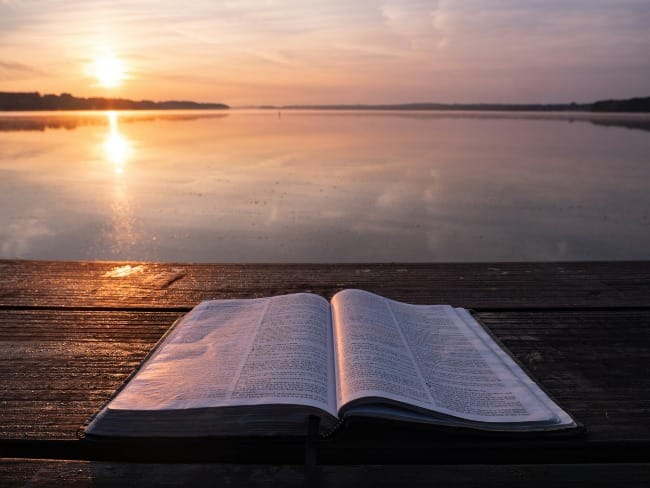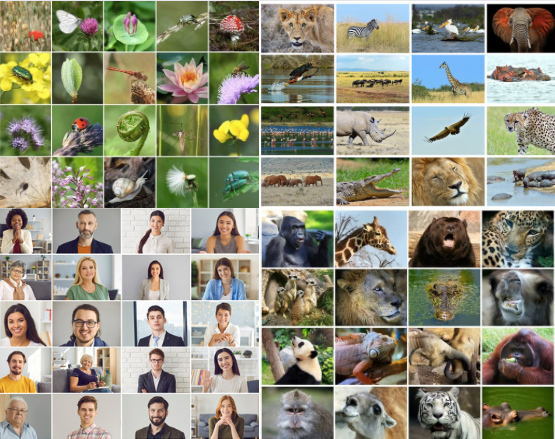When I was 15, I was called out by a travelling preacher in the shabby conference room of the only motel in Lancaster, NH. She declared, in front of the small crowd that had gathered for revival, “There’s an evangelist!” It was an unexpected moment, to say the least, but not as unexpected as the instantaneous response I felt in my mind and body: Yes! This was my calling.
An evangelist is someone who shares the good news, or “gospel,” of Jesus Christ with others, a definition that begs the question, "So what is the good news?" Since that surprising moment in the motel conference room, I have not stopped asking that question. I have asked it in the diverse churches I have attended, the Sunday School classes I have sat through, and the mission trips I have taken. I have asked it while walking in the forests of New England, building Habitat for Humanity homes in South Africa, and advocating for just policies in the halls of Congress. I have asked it in every theology class I have taken, every sermon I have preached, every hospital visit I have made. I continue to ask it in the face of our current social unrest, gobal conflicts, and ecological crisis. What is the good news?
My answer to that question has changed over the years - what I write below is a much more expansive and mysterious account of the gospel than what I would have said to the preacher who called me out several decades ago. But before we get there, it is important to note I have wrestled with the nature of the good news, in part, because of my dissatisfaction with the answers I have been given. I have learned so much from teachers, preachers, and churches over the years, but I have also realized that most of them do not tell the full story.

Partial Stories of Faith
Some of the Christian communities I have been part of emphasize the personal dimensions of the story, with particular emphasis on personal conversion. Jesus died for your sins so you can be "born again" and go to heaven when you die. Some of these communities also emphasize the need to pursue a life of personal devotion and pure living, which is typically defined by regular prayer and bible reading, and avoiding whatever the church defines as sinful behavior. This approach has shaped my faith in some good ways, but it interprets the gospel through a Western, individualistic framework that is foreign to the Bible's communal focus.
Some other Christian communities I have been part of focus heavily on the communal dimensions of the story. They seek to follow Jesus' example of compassion and mercy by organizing ministries that treat people with dignity and meet practical needs. Some also emulate the prophetic witness that is woven throughout the story (including Jesus) by seeking to expose the systems that perpetuate poverty or oppression and to make things right through the pursuit of social justice. This approach has also shaped my faith in some good ways, but the story that gets told is often reduced to the (worthy) goal of a just human society in which basic physical needs are met.
My faith has benefited from the diversity of Christian communities I have participated in, and I continue to learn from them all. I have come to see, however, that, despite their diversity, all of them share one important distinction: they are exclusively focused on human beings. The stories they tell basically restrict the good news to human beings, whether the focus in on humanity's relationship with God, or our relationships with one another.
The gospel is certainly good news for us human beings, but I have learned that it doesn’t stop there. The longer I follow Jesus, the bigger the story gets. In addition to the personal and social dimensions, there are ecological and cosmic dimensions as well. It is this grander story that is told by the Bible, although we have not been trained to see it.

The Big Story of the Bible, in Brief
The Bible begins by describing a cosmos created by God, within which the earth is formed to host increasingly diverse and numerous forms of life. It is a world full of potential and possibility. Unfortunately, the very creatures brought forth to help care for this new world, human beings, reject their calling. They try to “become like God” in knowledge and power before learning how to emulate God's sacrificial love and care. Their choice throws the world off course and initiates a kind of ecological undoing of the interconnected, interdependent relationships between God, humans, and the earth.
As the consequences mount, God begins the healing process by calling Abraham, Sarah, and their descendants to show the world what true humanity looks like – a servant people blessing the nations and the earth. This continues in the people of Israel, whose stories of inspiring success and catastrophic failure take up most of the Old Testament.
Eventually, God enters the story in a new way, becoming human in Jesus. The four Gospels tell the story of his life, death, and resurrection, through which Jesus embodies God's sacrificial love and initiates God’s work to renew creation. Jesus shows us what humanity is meant to be, what it looks like to be in right relationship with God, one another, and all creation. He also makes it possible for us to live like him, tomove toward maturity and become, as we were created to be, partners with God for the good of creation.
The rest of the New Testament unpacks what it means to follow Jesus personally, socially, and ecologically. He is referred to as the lord of all creation (see Colossians 1), and to be part of his community of followers is to demonstrate what it means to be citizens of this new creation, living in right relationship with God, each other, and the earth.
The Bible concludes with the symbolic story of Revelation, which gives us images of a future in which God rids the world of all the forces of death and destruction, and renews creation fully and finally through the unification of heaven and earth.
For most Christians, this summary of Scripture is different from the story they typically taught. Biblical scholar J. Richard Middleton notes,

Shifting one's faith to make room for a bigger gospel can be difficult, but it is a shift that must be made. It is more faithful to what the Bible actually says, and it is far more helpful to us as we discern what discipleship looks like in an age where ecological knowledge and damage are both growing quickly. It also allows us to see God's hand at work wherever restoration and renewal occurs, and to work with (and learn from) whoever is leading the way. I am encouraged to see more and more people, and churches, make this shift - but we have a long way to go.
If you want to shift your faith towards a more expansive understanding of the gospel, you can read the Bible with an eye for the personal, social, ecological, and cosmic dimensions in each text. And if you want some help, there are a growing number of incredible resources, including books such as A New Heaven and New Earth, which is quoted above. If you would like other suggestions, please let me know.
You can also join me in asking, "What is the good news?" as you listen to a sermon, do your daily work, or walk through your neighborhood. This practice helps me remember that God is present and active in all things, and it expands my heart and my imagination as I seek to follow Jesus.

Good News for Every Creature
Whenever you share or participate in the expansive good news, you do the work of an evangelist. You do not need to be called out by a traveling preacher, or stand on a street corner, or go to seminary. You just need to see yourself in the story, to recognize that your life is an essential part of God’s work in Christ to “reconcile to himself all things, whether things on earth or things in heaven, by making peace through his blood, shed on the cross.”(Col. 1:20). This is the good news that we have been called to share, “the gospel that you heard and that has been proclaimed to every creature under heaven” (Col. 1:23).
It is a good story to tell, and even better one to live.
With you on the Way,
James
Take a moment with the questions below, and please share your thoughts in the comments, or email me directly at james.amadon@circlewood.online.
Reflection Questions: